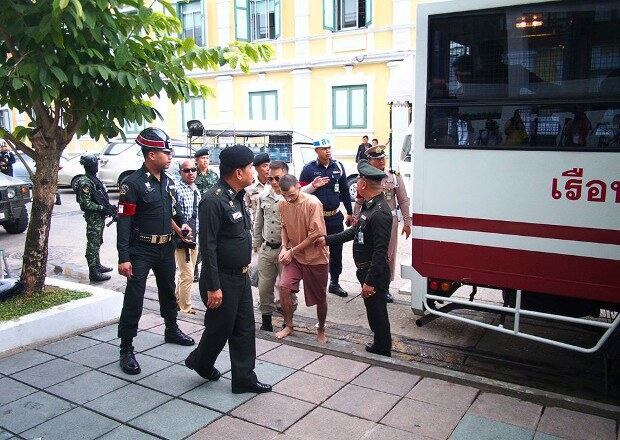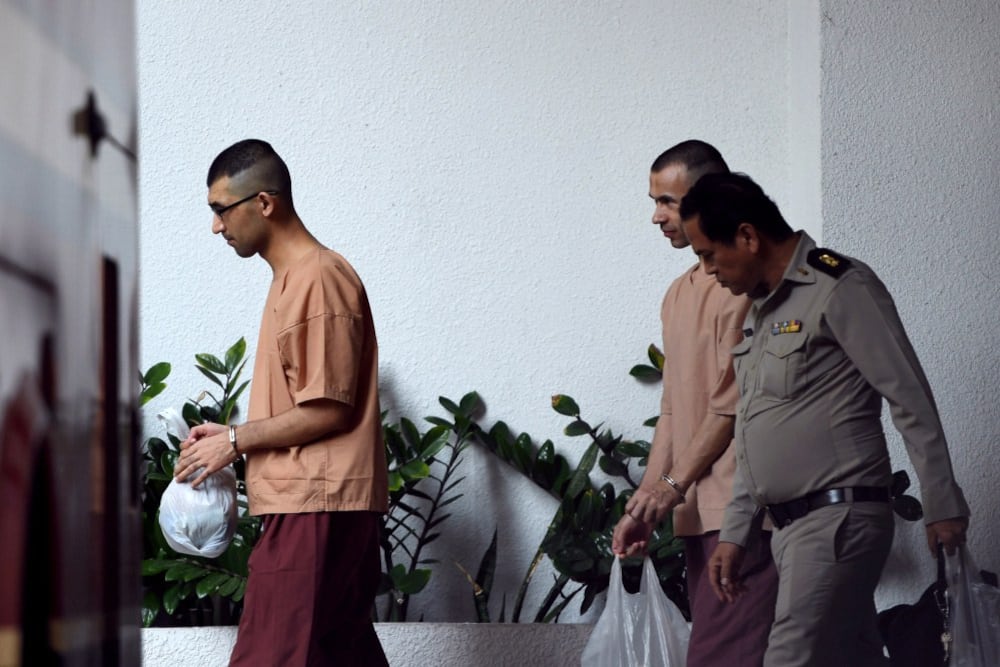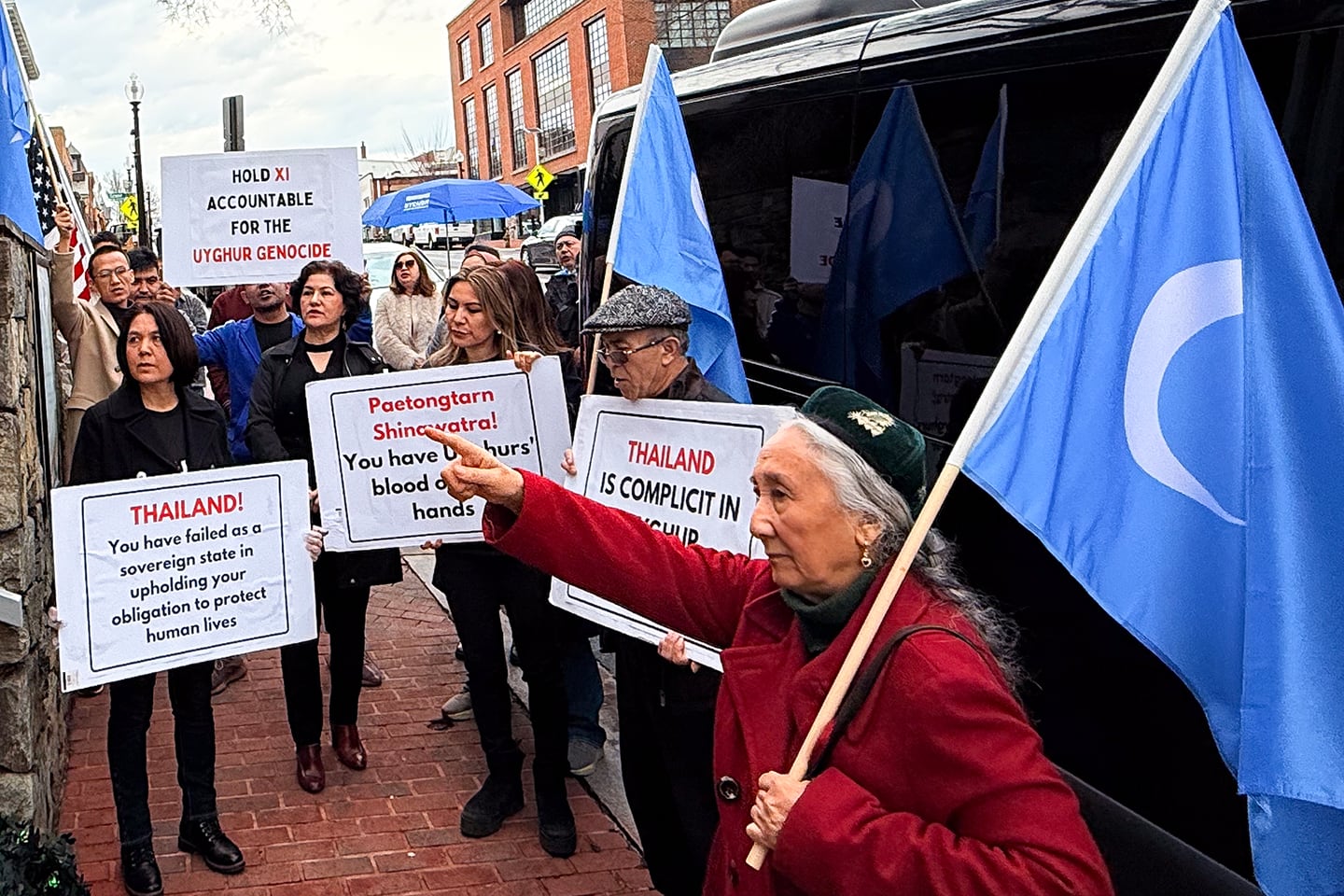BANGKOK – A Thai court slashed the number of prosecution witnesses for the long-stalled trial of two Uyghur men incarcerated for a decade following the retaliatory bombing of a Bangkok shrine popular with Chinese visitors.
Adem Karadag and Yusufu Mieraili, both handcuffed and shackled, appeared Thursday at a Bangkok criminal court for a fresh arraignment aimed at speeding up proceedings in the politically sensitive case.
“I still have hope for freedom,” Karadag told Radio Free Asia through a courtroom interpreter. “I want to go anywhere but not to be sent back to China like others.”
Both men smiled and hugged their Thai lawyer and Uyghur interpreter.
“I exercised. I can eat well,” Mieraili said in Thai.
Both men deny they triggered the Erawan Shrine bomb in the Aug. 17, 2015 attack that was apparent retaliation for Thailand’s repatriation of dozens of Uyghur migrants to China, where they face high risk of persecution.
Twenty people died in the bombing of the Hindu shrine in downtown Bangkok and more than 120 more injured.
The trial has languished due to jurisdiction changing between civilian and military courts amid regime changes in Thailand. Lack of qualified courtroom interpreters also has caused delays.
The criminal court on Thursday cut the number of prosecution witnesses to 20 from 55 to shorten the trial. It has set 11 court dates from September to December. The pair are charged with first-degree murder and could face execution if found guilty.
Police arrested Karadag and Mieraili shortly after the bombing based on CCTV footage, but failed to find dozens of other alleged perpetrators.
The trial is expected to finish next year, said Chuchart Gunpai, a lawyer for the defendants.
Uyghur exodus through Southeast Asia
Uyghurs are Turkic-speaking Muslims who mostly live in the Xinjiang region of China but are also spread across Kazakhstan, Kyrgyzstan, Uzbekistan and Turkey. They have been fleeing China in large numbers to escape what they describe as persecution and repression by Chinese authorities – allegations that Beijing denies.
Before the bombing, nearly 400 Uyghurs who fled China were arrested in Thailand in 2014, according to the Thai foreign ministry. The fleeing Uyghurs were hoping for resettlement in Turkey via Malaysia, right advocates and other lawyers said. Others likely slipped through the Thai-Malaysian border without detection by authorities.
In June 2015, Thailand allowed 172 Uyghur women and children to leave for Turkey, but two weeks later appeared to bow to pressure from Beijing and put 109 Uyghur men, blindfolded, on a plane back to China, provoking international condemnation.
The Thai foreign ministry said at that time the men “have been verified as Chinese and evidence of their involvement in criminal activities has been sent by the Government of China.”
The decision drew condemnation from the World Uyghur Congress, an exiled Uyghur group, which claimed 25 Uyghurs were killed resisting the forced deportation. Thailand denied any deaths.
“Had Thailand followed the principle of not sending people into harm’s way, these mishaps could have been avoided,” Chalida Tarjaroensuk, the director of the People’s Empowerment Foundation, who assisted the Uyghurs, told RFA.
Poor conditions
Following the deportations and the arrests of Karadag and Mieraili in 2015, more than 50 Uyghurs remained in Thai immigration prison until earlier this year.
Some said they were denied proper lawyer visits and kept in cramped unhygienic cells without adequate medical care. Thai officials said three detainees died during their imprisonment.
Some 40 of the imprisoned Uyghurs were deported to China in the dead of night on Feb. 27. Reporters who traveled with Thai officials to China to check on conditions for the deported men said they were subjected to Chinese surveillance.
Another three Uyghur men, who held Kyrgyzstan passports, were resettled in Canada.
Five Uyghurs are continuing to serve sentences for jailbreaking, according to Chalida, who fears they will also face deportation to China after their release in the next year or two.
Edited by Stephen Wright and Taejun Kang.



